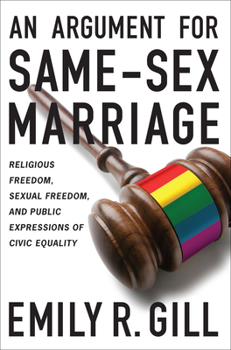An Argument for Same-Sex Marriage: Religious Freedom, Sexual Freedom, and Public Expressions of Civic Equality
(Part of the Religion and Politics Series and Religion and Politics Series)
Religion and sexuality are central to personal identity, and the relationship between how the Constitution and the courts and public policy interpret one's religious beliefs and one's sexuality offer provocative comparisons. Although both religion and sexuality are seemingly private matters, in practice the dominant consensus tends to enshrine majoritarian views in ways that marginalize dissenters. Despite the non-establishment of religion--there is no official state religion in the US-and the constitutional guarantee of the free exercise of religion, Christianity functions as the religious and moral standard in the United States. Ethical views that do not fit within, or at least overlap, this consensus often go unrecognized as moral values. Similarly, in sexual orientation the role of Christianity is seen as normative, which takes heterosexuality as the yardstick by which sexual practices are measured. The notion that "alternative" sexual practices, i.e., homosexuality, could possess ethical significance is often overlooked or ignored. Gill contends that just as US law and policy ensure that citizens may express religious beliefs as they see fit, US law and policy should also ensure that citizens may marry as they see fit. Civil marriage, she argues, is a public institution, and the exclusion of some couples from a state institution is a public expression of civic inequality. Lacking evidence of social harm, public authority must accord equal treatment to all manifestations of religious beliefs and to sexuality--including civil recognition of same-sex marriage as a public expression of civic equality.
Format:Paperback
Language:English
ISBN:1589019202
ISBN13:9781589019201
Release Date:August 2012
Publisher:Georgetown University Press
Length:290 Pages
Weight:0.86 lbs.
Dimensions:1.0" x 6.1" x 9.1"
Grade Range:Postsecondary and higher
Customer Reviews
0 rating





